《新世纪英语》高二(上)【共364词】
上海新世纪英语高二年级上学期第二单元教材精讲
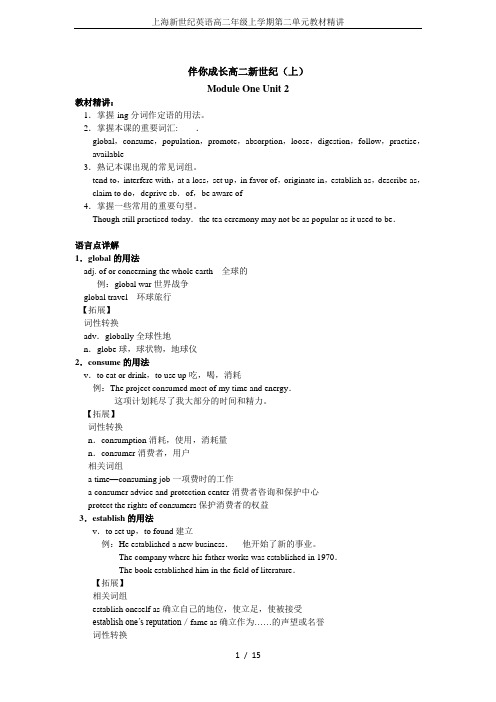
伴你成长高二新世纪(上)Module One Unit 2教材精讲:1.掌握-ing分词作定语的用法。
2.掌握本课的重要词汇: .global,consume,population,promote,absorption,loose,digestion,follow,practise,available3.熟记本课出现的常见词组。
tend to,interfere with,at a loss,set up,in favor of,originate in,establish as,describe as,claim to do,deprive sb.of,be aware of4.掌握一些常用的重要句型。
Though still practised today.the tea ceremony may not be as popular as it used to be.语言点详解1.global的用法adj. of or concerning the whole earth 全球的例:global war世界战争global travel 环球旅行【拓展】词性转换adv.globally全球性地n.globe球,球状物,地球仪2.consume的用法v.to eat or drink,to use up吃,喝,消耗例:The project consumed most of my time and energy.这项计划耗尽了我大部分的时间和精力。
【拓展】词性转换n.consumption消耗,使用,消耗量n.consumer消费者,用户相关词组a time—consuming job一项费时的工作a consumer advice and protection center消费者咨询和保护中心protect the rights of consumers保护消费者的权益3.establish的用法v.to set up,to found建立例:He established a new business.他开始了新的事业。
上海新世纪英语高二全部课文

Sheet 1: Rearrange Paragraphs (Shopping in the States) Rearrange the disordered paragraphs below, and tell your classmates what clues help you to find out the correct order. (underlined phrases are for your reference)将下列打乱顺序的段落重新排序,告诉同学们你排序的依据。
(划线部分供参考)Sheet 2: Class Activity OutlineJigsaw Reading(Aim: catch the logic and structure)Loot at sheet 1, you may find the whole passage but in disorder. 2 minutes for you to rearrange these paragraphs. (You may refer to page 92 for new words and expressions) Skimming(Aim: know something about Expository writing and Narrative writing)Skim over the text and find out whether it is written mainly in the present tense or past tense? Is there any exception? Why?Reading aloud & Scanning(Aim: pay attention to pronunciation)(Aim: search out key information: 6Ws of the story)Read paragraph D and find out the 6 Ws (When, Where, Who, What, How, Why)Pair Talk & Role Play(Aim: cooperate to create dialogues according to situation in the text)(Aim: try to use language in situation-based activity; improve performing ability)Now work with your partner and role play the dialogue between the customer and the lady at the service counter.You may design dialogues by yourself. 2 minutes for preparation.Translation(Aim: cultivate language sense, especially for vivid expressions)You Name It!You won’t be challenged…Brainstorm(Aim: expand vision in cooperative study)Compare the advantages of E-shopping and Store shopping.Group leader please come to the front and write down the key points from your group members.Homework(Aim: shift attention to locality and reinforce textual content)(Aim: put the types of writing learned in this lesson into use)Do some research and write an article entitled “Shopping in China”.A combination of Expository and Narrative way of writing is suggested.A comparison between shopping in the States and shopping in China will be welcomed.。
上海新世纪英语高二年级上学期第五单元教材精讲

伴你成长高二新世纪(上)Module Three Unit 5教材精新目标扫描l.复习动词不定式的进行式和完成式的用法。
2.掌握本课的重要单词及用法。
quit,wonder,crazy,thrill,crash,fall,filter,silence,pack,curious,prime,scratch,practically,tremble,wrapping3.熟记本课出现的常见词组。
be crazy about,be thrilled at sth./to do sth.,come over,show off,head for,turn over, settle down,pick up,without/beyond/out of reach.feed sb.sth..,feed sth..to sb./feed sb.with/on sth.,shoot at4.掌握一些常用的重要句型。
(I)I wonder if/whether 我想知道是否……(2)It was…that…强调句型(3)Sb.could/must have done 情态动词的虚拟语气(4)(It’s)no wonder ……不奇怪.不足为奇5.能力要求。
(1)Describing animals(2)Telling and retelling a story(3)Reporting语言点详解1.不定式的进行式的用法不定式的进行式(to be doing)表示与谓语动词同时发生的动作。
例:The old woman seemed to be enjoying herself常与不定式的进行式连用的动词有:pretend,happen,think,believe,consider,say,seem,appear,report等例:She happened to be doing her homework when her father came back比较:Mr. Wang is said to write a letter to his s6n据说王先生要给他儿子写信。
上海新世纪英语高二上册同步全解
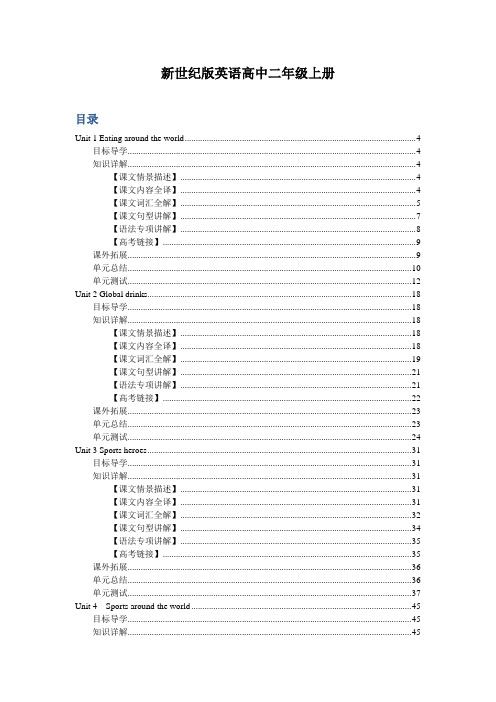
新世纪版英语高中二年级上册目录Unit 1 Eating around the world (4)目标导学 (4)知识详解 (4)【课文情景描述】 (4)【课文内容全译】 (4)【课文词汇全解】 (5)【课文句型讲解】 (7)【语法专项讲解】 (8)【高考链接】 (9)课外拓展 (9)单元总结 (10)单元测试 (12)Unit 2 Global drinks (18)目标导学 (18)知识详解 (18)【课文情景描述】 (18)【课文内容全译】 (18)【课文词汇全解】 (19)【课文句型讲解】 (21)【语法专项讲解】 (21)【高考链接】 (22)课外拓展 (23)单元总结 (23)单元测试 (24)Unit 3 Sports heroes (31)目标导学 (31)知识详解 (31)【课文情景描述】 (31)【课文内容全译】 (31)【课文词汇全解】 (32)【课文句型讲解】 (34)【语法专项讲解】 (35)【高考链接】 (35)课外拓展 (36)单元总结 (36)单元测试 (37)Unit 4 Sports around the world (45)目标导学 (45)知识详解 (45)【课文情景描述】 (45)【课文内容全译】 (45)【课文词汇全解】 (46)【课文句型讲解】 (48)【语法专项讲解】 (48)【高考链接】 (49)课外拓展 (50)单元总结 (50)单元测试 (51)Unit 5 Animals (58)目标导学 (58)知识详解 (58)【课文情景描述】 (58)【课文内容全译】 (58)【课文词汇全解】 (59)【课文句型讲解】 (61)【语法专项讲解】 (61)【高考链接】 (62)课外拓展 (62)单元总结 (63)单元测试 (64)Unit 6 The environment (71)目标导学 (71)知识详解 (71)【课文情景描述】 (71)【课文内容全译】 (71)【课文词汇全解】 (72)【课文句型讲解】 (74)【语法专项讲解】 (74)【高考链接】 (74)课外拓展 (75)单元总结 (76)单元测试 (76)Unit 7 Shopping experiences (83)目标导学 (83)知识详解 (83)【课文情景描述】 (83)【课文内容全译】 (83)【课文词汇全解】 (84)【课文句型讲解】 (85)【语法专项讲解】 (86)【高考链接】 (87)课外拓展 (87)单元总结 (88)单元测试 (89)Unit 8 Advertising (97)目标导学 (97)知识详解 (97)【课文情景描述】 (97)【课文内容全译】 (97)【课文词汇全解】 (98)【课文句型讲解】 (100)【语法专项讲解】 (100)【高考链接】 (101)课外拓展 (101)单元总结 (102)单元测试 (103)期中测试 (110)期末测试 (116)Unit 1 Eating around the world目标导学知识详解【课文情景描述】汉语描述世界食品英语描述Food in the world【课文内容全译】教材原文Many changes are taking place in food styles in the United States.The United States is traditionally famous for its very solid and unchanging diet, chiefly made up of meat and potatoe s.Now people in America have many different choices: ethnic food, health food, and fast food, in ad dition to the traditional home-cooked meal.Ethnic restaurants and supermarkets are common in the United States.Health food became popular when people began to think more seriously about their physical well-being.In the United States, speed is a very important concept.A balanced diet provides your body with nutrition.If you invite minority friends to dinner at home , you must respect their ethnic customs.Fast food restaurants are now expanding rapidly all over the country.People usually have a short lunch break because they just do not want to waste their time eating. Americans‟ attitude toward food is changing, too.The traditional big breakfast is no longer popular.汉语翻译在美国食品风格发生了许多变化。
上海新世纪英语高二全部课文及重点词组
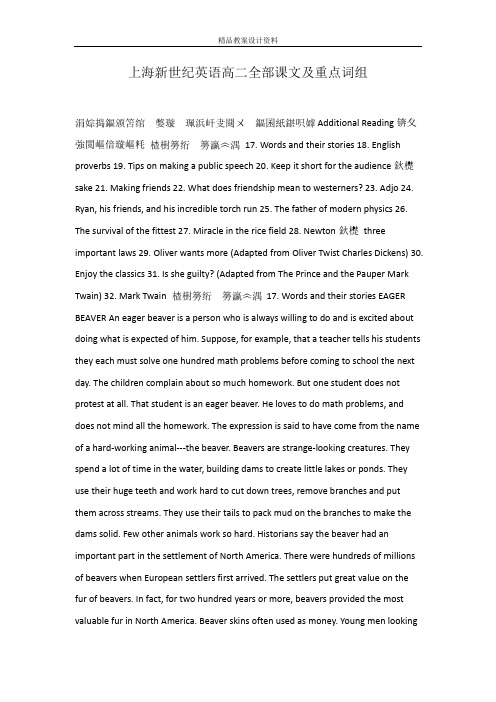
上海新世纪英语高二全部课文及重点词组Additional Reading锛夊強閲嶇偣璇嶇粍17. Words and their stories 18. English proverbs 19. Tips on making a public speech 20. Keep it short for the audience鈥檚sake 21. Making friends 22. What does friendship mean to westerners? 23. Adjo 24. Ryan, his friends, and his incredible torch run 25. The father of modern physics 26. The survival of the fittest 27. Miracle in the rice field 28. Newton鈥檚three important laws 29. Oliver wants more (Adapted from Oliver Twist Charles Dickens) 30. Enjoy the classics 31. Is she guilty? (Adapted from The Prince and the Pauper Mark Twain) 32. Mark Twain 17. Words and their stories EAGER BEAVER An eager beaver is a person who is always willing to do and is excited about doing what is expected of him. Suppose, for example, that a teacher tells his students they each must solve one hundred math problems before coming to school the next day. The children complain about so much homework. But one student does not protest at all. That student is an eager beaver. He loves to do math problems, and does not mind all the homework. The expression is said to have come from the name of a hard-working animal---the beaver. Beavers are strange-looking creatures. They spend a lot of time in the water, building dams to create little lakes or ponds. They use their huge teeth and work hard to cut down trees, remove branches and put them across streams. They use their tails to pack mud on the branches to make the dams solid. Few other animals work so hard. Historians say the beaver had an important part in the settlement of North America. There were hundreds of millions of beavers when European settlers first arrived. The settlers put great value on the fur of beavers. In fact, for two hundred years or more, beavers provided the most valuable fur in North America. Beaver skins often used as money. Young men lookingfor adventure headed west across the country to search for beavers. In their search, they explored much of the western territories. The trading posts, where they exchanged beaver skins for the goods they needed, became villages, and later towns and cities. IT鈥橲IN THE BAG The bag---one of the simplest and most useful things in every man or woman鈥檚life---has given the world many strange expressions that are not very simple. A number of these expressions are widely used in the United States today. Some were imported from England a long time ago. When you are sure of something, you can say, 鈥淚t鈥檚in the bag.鈥?This phrase seemed to have arrived with the modern paper bag. Before, Americans used to say, 鈥淚t鈥檚all wrapped up.鈥?Then, things you bought were wrapped in plain brown paper, or sometimes in old newspaper. Another widely used expressions is 鈥渢o let the cat out of the bag鈥? meaning to reveal a well-kept secret. No one can explain how the cat got into the bag, or why it remained there. But there is an old story about it. Long ago tradesman sold things in large cloth bags. Once a woman asked for a pig. The tradesman held up his cloth bag. Inside there was supposed to be a live pig. The woman asked to see it. When the dishonest tradesman opened the bag, out jumped a squealing cat, not a pig. The tradesman鈥檚secret was out: he was tricky, and now everybody knew it. 18. English proverbs Characters Teacher of English: Ms Smith (MS) Students: Li (LI), Mao (MA), Anne (AN), Rivera (RI) MS: Good morning, everyone.I hope you all know what we are here for. The topic of our discussion this morning is 鈥淓nglish Proverbs鈥? LI: So, I鈥檓in the right group. MA: Me, too. RI: Me, too. MS: But I was told we would have four nd yet鈥?AN: I鈥檓coming. Good morning. Am I late? MS: Morning. 鈥淪peak of angels and you hear their songs.鈥?AN: Is that a proverb referring to my coming? MS: Exactly. LI: We have a saying in Chinese, which I think is very close in meaning鈥?MA: Speak of Cao Cao and he appears. MS: Right. Well, 鈥渇irst things first鈥? A proverb is a traditional saying which offers advice or presents a moral in a short and brief manner. A proverbnormally is a sentence, into which the writer often works rhyme. For instance, 鈥淓ast or west, home is best.鈥?Sometimes it comes out in the form of a phrase. MA: I 鈥檝e seen dictionaries of proverbs. MS: Well, there are thousands of proverbs. They fall into three main categories. Those of the first type take the form of abstract statements. They express general truths. Here are two good examples: 鈥淥ne is never too old to learn.鈥?and 鈥淎man who neglects his studies in youth will regret it in later years.鈥?RI: I think there is some truth in both proverbs. To encourage a person who has had little education for some reason as a young man, we may use the former. With us, I guess the latter works. MS: So you have to keep this in mind. Never use proverbs out of context. 鈥淥ne man鈥檚meat is another man鈥檚poison.鈥?LI: I see. Then, what is the second type? MS: The second type uses specific observations from everyday experience to make a general point. AN: 鈥淒on鈥檛put all your eggs in one basket.鈥?Does it fall into the second category? MS: You鈥檙e right, dear. Then the third type consists of sayings from particular areas of traditional customs and beliefs. 鈥淎fter dinner, rest a while; after supper, walk a mile.鈥?is an example of this type. Such proverbs are often related to agriculture, the seasons, and the weather. LI: Many people hold the opinion that proverbs are going out of fashion. Is that true? MS: The fact is, as some old ones are falling into disuse, new ones are being created. The computer world has recently given us lots of them. AN: I鈥檝e got one: 鈥淩ubbish in, rubbish out.鈥?MA: It also goes 鈥淕arbage in, garbage out.鈥?MS: I think it is more common to say 鈥淕arbage in, garbage out.鈥?Well, I hope, today 鈥淵ou鈥檒l have something nice out as you have had something nice in.鈥?AN: Thank you, Ms Smith. By the way, do we have an assignment as usual? MS: Yes. You are to collect some proverbs of the first type, that is, proverbs that express general truths. LI: I鈥檇like to collect some on studies. MS: Good! I鈥檓so glad to have been with you. (To the four students) 鈥淪trike while the iron is hot.鈥?See you next week. 19. Tips on making a publicspeech It is interesting to note that speeches are always 鈥済iven鈥?or 鈥渄elivered鈥? They are never 鈥渟aid鈥? When giving a speech, therefore, it is useful to think of yourself as playing a part, i.e. acting. This kind of acting calls for an integration of verbal and nonverbal communication. Nonverbal communication chiefly involves the speaker鈥檚stance and gestures, the eye contact between the speaker and the audience, and a good control of the presentation speed oftalking/speaking. STANCE This is important to the delivery of a good speech. Stand up straight and keep your head up. Dropping your head looks unprofessional and may prevent your audience from hearing you clearly. On the other hand, don鈥檛stand like a guard on duty. You have to be able to move in a natural way in order to add expression to your words. Body language 鈥渟ays鈥?a lot. Avoid holding your hands tightly together; this will interfere with free and natural movement. Don鈥檛play with keys or coins in your pocket; this will distract your audience. GESTURES Gestures and facial expressions are both important aids to the spoken word when you are communicating. A dull, long speech delivered without expression, without gestures or eye contact will not be well received. The skill is in deciding how much gesturing to be employed and in making sure that your gestures are natural. In general, the larger the audience, the more expansive the gestures should be, because they will not be seen so clearly by the audience. In a small group, facial expressions will add a lot to understanding. Try telling somebody something funny with a very serious face. They will have difficulty believing what you are really saying is funny. Different gestures are supposed to be used in delivering a speech. Some people use their hands a lot when speaking. You must make sure that your gestures are not repeated too often, and they should be expressive and meaningful. EYE CONTACT To have maximum impact you need to make each member of your audience fell as if you were speaking to them personally. To do this, glance towards all sections of the audience and don鈥檛be afraid to move your head. If you favourone direction, the other side may feel you are ignoring them and therefore lose interest in what you are saying. TIMING Accurate timing is essential. You should ensure that you don鈥檛fall short of or run over the time allowed for your speech. Either way, the audience will feel unhappy and lose concentration on your speech. The best way to overcome this is through preparation. Clear thinking about what you want to say and how long your speech will last, before you start to write it, will save a lot of time. When practising, make sure that you speak at the correct speed and do time yourself. 20. Keep it short for the audience鈥檚sake How long should I make my speech? How long will my audience concentrate on my speech? Hoe slowly should I speak to make myself clearly understood? In trying to answer these questions, we see how important timing is to speech. KEEP YOUR SPEECH LESS THAN 15 MINUTES Lin Yutang, the famous writer and translator, once said about the length of a speech, 鈥渢he shorter, the better.鈥?Speaking around the topic should be seriously avoided, not only in speech, but in all conversations in English. Being indirect and roundabout in your approach may be thought skillful in Chinese. But in English speech? No way. When one is making a speech in English, he should always stick to the point, and use simple, clear, and direct language. According to scientists, audiences can generally only manage to concentrate for about 13 minutes. So a10-15-minute speech is about right. The famous Gettysburg Address, delivered by Abraham Lincoln on November 19, 1863 has about 200 words, but it still managed to express the idea that all people are born equal. 150-160 WORDS PER MINUTE Speaking speed often depends on the occasion for the speech. The number of people in the audience is also an important factor to be considered. If you are speaking to hundreds or even thousands of people, especially in the open air, you should。
上海新世纪英语高二年级上学期第一单元教材精讲

伴你成长高二新世纪(上)Module One Unit 1教材精讲:目标扫描:1.掌握一ing分词作状语的用法。
2.掌握本课的重要词汇。
solid,chiefly,alternative,various,ethnic,immigrant,variety,vast,choice,region,California,Mexican,unprocessed,preservative,protein,vegetarian3.熟记本课出现的常见词组。
in addition to,be filled with,be well known for,a variety of,be keen on,lunch break,take time to do sth.even if4.掌握一些常用的重要句型。
语言点详解1.-ing分词作状语的用法一ing分词的结构一ing分词作状语可表示时间、原因、条件、结果、让步、方式、伴随等意义,这时它相当于一个状语从句。
作原因状语例:Being ill today,Mary is absent from the English test.作时间状语例:When looking out of the window,you can see the famous Opera House.作伴随状语例:They went back home,chatting and laughing·作结果状语例:He died from a sudden traffic accident,leaving the experiment half—done.作条件状语例:Listening to English every day,you’ll learn it well step by step.注意点:(1)-ing分词作状语与-ed分词作状语的区别一般来说,-ing分词表示主动、进行;-ed分词表示被动、完成。
上海新世纪英语高二年级上学期第六单元教材精讲
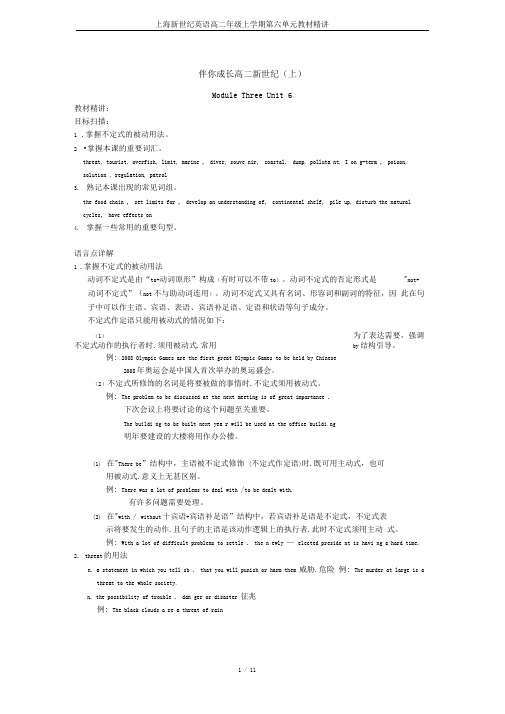
伴你成长高二新世纪(上)Module Three Unit 6教材精讲:目标扫描:1.掌握不定式的被动用法。
2•掌握本课的重要词汇。
threat, tourist, overfish, limit, marine , diver, souve nir, coastal. dump, polluta nt, I on g-term , poison, solution , regulation, patrol3.熟记本课出现的常见词组。
the food chain , set limits for , develop an understanding of, continental shelf, pile up, disturb the natural cycles, have effects on4.掌握一些常用的重要句型。
语言点详解1 .掌握不定式的被动用法动词不定式是由“to+动词原形”构成(有时可以不带to)。
动词不定式的否定形式是"not+ 动词不定式”(not不与助动词连用)。
动词不定式又具有名词、形容词和副词的特征,因此在句子中可以作主语、宾语、表语、宾语补足语、定语和状语等句子成分。
不定式作定语只能用被动式的情况如下:(1)为了表达需要,强调不定式动作的执行者时.须用被动式.常用by结构引导。
例: 2008 Olympic Games are the first great Olympic Games to be held by Chinese2008年奥运会是中国人首次举办的奥运盛会。
(2)不定式所修饰的名词是将要被做的事情时.不定式须用被动式。
例: The problem to be discussed at the next meeting is of great importanee .下次会议上将要讨论的这个问题至关重要。
The buildi ng to be built next yea r will be used at the office buildi ng明年要建设的大楼将用作办公楼。
《新世纪英语》高二(下)【共363词】
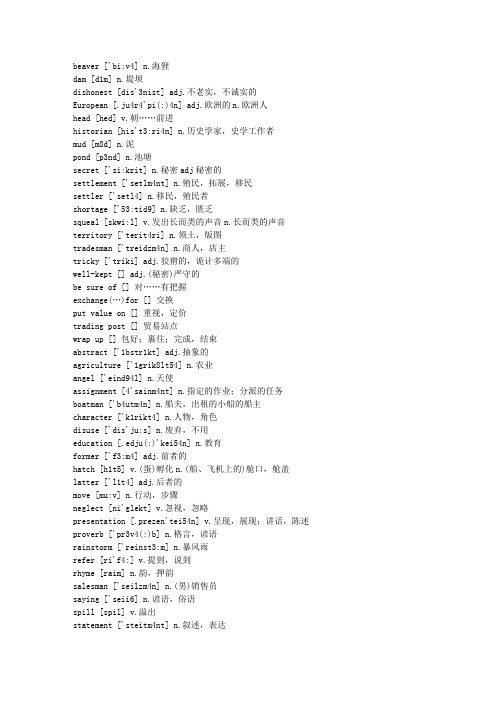
beaver ['bi:v4] n.海狸dam [d1m] n.堤坝dishonest [dis'3nist] adj.不老实,不诚实的European [.ju4r4'pi(:)4n] adj.欧洲的n.欧洲人head [hed] v.朝……前进historian [his't3:ri4n] n.历史学家,史学工作者mud [m8d] n.泥pond [p3nd] n.池塘secret ['si:krit] n.秘密adj秘密的settlement ['setlm4nt] n.殖民,拓展,移民settler ['setl4] n.移民,殖民者shortage ['53:tid9] n.缺乏,匮乏squeal [skwi:l] v.发出长而类的声音n.长而类的声音territory ['terit4ri] n.领土,版图tradesman ['treidzm4n] n.商人,店主tricky ['triki] adj.狡猾的,诡计多端的well-kept [] adj.(秘密)严守的be sure of [] 对……有把握exchange(…)for [] 交换put value on [] 重视,定价trading post [] 贸易站点wrap up [] 包好;裹住;完成,结束abstract ['1bstr1kt] adj.抽象的agriculture ['1grik8lt54] n.农业angel ['eind94l] n.天使assignment [4'sainm4nt] n.指定的作业;分派的任务boatman ['b4utm4n] n.船夫,出租的小船的船主character ['k1rikt4] n.人物,角色disuse ['dis'ju:s] n.废弃,不用education [.edju(:)'kei54n] n.教育former ['f3:m4] adj.前者的hatch [h1t5] v.(蛋)孵化n.(船、飞机上的)舱口,舱盖latter ['l1t4] adj.后者的move [mu:v] n.行动,步骤neglect [ni'glekt] v.忽视,忽略presentation [.prezen'tei54n] v.呈现,展现;讲话,陈述proverb ['pr3v4(:)b] n.格言,谚语rainstorm ['reinst3:m] n.暴风雨refer [ri'f4:] v.提到,说到rhyme [raim] n.韵,押韵salesman ['seilzm4n] n.(男)销售员saying ['seii6] n.谚语,俗语spill [spil] v.溢出statement ['steitm4nt] n.叙述,表达string [stri6] n.一连串,一系列truth [tru:7] n.真理youth [ju:7] n.青春暑期青少年时代a string of [] 一系列的fall into [] 分为(……部分),陷入(……境况)give birth to [] 使……产生,生育in a(n)…manner [] 以……方式in the form of [] 以……的形式keep…in mind [] 记住,记着make a point [] 提出一个论点(意见)make the first move [] 先采取行动out of context [] 脱离上下文out of fashion [] 过时take the form of [] 以……的形式出现delivery [di'liv4ri] n.演讲风格;送货distract [dis'tr1kt] v.使转移注意力,使分心expansive [iks'p1nsiv] adj.(面积)广阔的,(动作)幅度大的expressie [] adj.富于表现力的integration [.inti'grei54n] n.结合nonverbal ['n3n'v4:b4l] adj.不用言辞表达的presentation [.prezen'tei54n] n.介绍,陈述stance [st1ns] n.姿势,姿态time [taim] v.记录……所需时间timing ['taimi6] n.时间的把握unprofessional ['8npr4'fe54nl] adj.外行的,违反职业准则的verbal ['v4:b4l] adj.口头的,非书面的eye contact [] 目光接触fall short of [] 缺少in general [] 总之lose interest in [] 对……失去兴趣make sure [] 确保play a part [] 扮演角色,在……中起作用run over [] 超过address [4'dres] n.讲话,演讲v.向……讲话impression [im'pre54n] n.印象,感想indiect [] adj.间接的,不直接了当的kid [kid] v.开玩笑,戏弄memorize ['mem4raiz] v.记住,熟记phonetic [f4u'netik] adj.语音的retain [ri'tein] v.保持,保有roundabout ['raund4baut] adj.拐弯抹角的,不直接的translator [tr1ns'leit4] n.翻译(者),译员come up with [] 想出,提出(主意等)for somebody's sake [] 为了……的利益from then on [] 从那里开始in the open air [] 在户外mess up [] 出错,弄乱additional [4'di54nl] adj.附加的,另外的approachable [4'pr4ut54bl] adj.随和的,易接近的attractive [4'tr1ktiv] adj.有吸引力的,漂亮的burden ['b4:dn] n.负担,重任v.被……所困扰,承受……负担compliment ['k3mplim4nt] n.恭维,赞美extremely [iks'tri:mli] adv.极端地,非常地genuinely ['d9enjuinli] adv.真诚地,诚实地magnet ['m1gnit] n.磁体;磁铁modesty ['m3disti] n.谦虚,虚心natural ['n1t54r4l] adj.表现自然的,不做作的;自然的,天然的zero ['zi4r4u] v.把注意力集中于……feel at ease [] 感到很轻松give and take [] 互相迁就go for [] 支持light up [] 显得高兴,容光焕发tear down [] 贬低zero in on [] 把注意力集中于……affection [4'fek54n] n.友爱;爱情characterize ['k1rikt4raiz] v.以……为特征childhood ['t5aildhud] n.童年,幼年时代define [di'fain] v.给……下定义definition [.defi'ni54n] n.定义,释义friendliness ['frendlinis] n.友好,亲切indication [.indi'kei54n] n.指示,迹象,暗示long-lasting ['l36'l2:sti6] adj.长久的mate [meit] n.同学,同事,同屋等mean [mi:n, min] adj.吝啬的mobility [m4u'biliti] n.活动性,灵活性mushroom ['m85rum] n.蘑菇v.快速成长,迅速发展respect [ri'spekt] n.尊重,尊敬short-term [] adj.签名,签署(合同等)westerner ['west4n4] n.西方人base…on [] 以……为基础hold true [] 适用,有效in reality [] 实际上in the wild [] 处于野生状态in the woods [] 在树木里autograph ['3:t4gr2:f] n.(名人的)亲笔签名cast [k2:st] v.投射(光、视线等)equivalent [i'kwiv4l4nt] n.同等物adj.相同的;同等的release [ri'li:s] v.释放,放出restless ['restlis] adj.不安定的skin [skin] n.(人或动物的)皮,皮肤suspicion [s4s'pi54n] n.疑心,怀疑Swedish ['swi:di5] n.瑞典语;瑞典人adj.瑞典的;瑞典人的;瑞典语的unfamiliar ['8nf4'milj4] adj.不熟悉的;不认识的as though [] 好像,仿佛be fresh from [] 新从……来的cast a glance at [] 看一眼finishing touch [] 点睛之笔in passing [] 顺便,附带地in shock [] 吃惊地take to [] 喜欢brotherhood ['br804hud] n.兄弟般的关系,手中情谊chant [t52:nt] v.(反复地)喊、说、唱等damage ['d1mid9] n.损伤,损失endure [in'dju4] v.忍受(痛苦、困难等)flame [fleim] n.火焰glory ['gl3:ri] n.光荣,荣誉,壮观gracious ['grei54s] adj.好心的,亲切的;优雅的highlight ['hailait] n.最精彩的部分historic [his't3rik] adj.有历史意义的last [l2:st] v.继续,持续;足够维持motion ['m4u54n] n.运动;动作seat [si:t] v.坐下短期的study ['st8di] n.书房torch [t3:t5] n.火把,火炬wheelchair ['wi:lt5e4(r)] n.轮椅at the sight of [] 看到brain damage [] 脑损伤come by [] 访问,看望drop by [] 顺便(或偶然)访问fall apart [] 瓦解,崩溃get in the way [] 妨碍line up [] 排队many a(n) [] 很多pass by [] (时间等)过去,流逝starting point [] 起点take…as an example [] 以……为例to the fullest [] 充分地,最大限度地up and down [] 来来回回,上上下下atomic [4't3mik] adj.原子的,原子能的clerk [kl2:k; kl4:k] n.办事员,职员explanation [.ekspl4'nei54n] n.解释,给出的原因gravity ['gr1viti] n.地心引力;引力mathematics [.m17i'm1tiks] n.数学nuclear ['nju:kli4] adj.原子核的;使用原子核的photoelectric [.f4ut4ui'lektrik] adj.光电的,光电效应的polytechnic [.p3li'teknik] a.工艺教育的professor [pr4'fes4] n.(大学)教授puzzling ['p8zli6] adj.令人迷藏的,令人费解的qualification [.kw3lifi'kei54n] n.资格,条件relativity [.rel4'tiviti] n.相对性,相关性a wealth of [] 大量的apart from [] 除了,除……以外atomic bomb [] 原子弹be fascinated by [] 对……着迷come to power [] 上台in the course of [] 在……过程中,在……期间leave behind [] 留下nuclear power [] 原子能pass away [] 去世photoelectric effect [] 光电效应speak out against [] 直言不讳地反对take…seriously [] 郑重对待,认真对待ancestor ['1ns4st4] n.祖先,祖宗ashore [4'53:] v.靠岸边;在陆地beak [bi:k] n.鸟嘴,喙bright [brait] adj.聪明的characteristic [.k1rikt4'ristik] n.(人或物的)特征,特性compass ['k8mp4s] n.指南针descent [di'sent] n.出身,血统essay ['esei, 'esi] n.短文,论文evolution [.i:v4'lu:54n, .ev4-] n.进化fossil ['f3sl] n.化石hunger ['h86g4] n.饥饿ignorant ['ign4r4nt] adj.无知的,没有学识的needle ['ni:dl] n.指针;缝衣针v.刺激;激怒origin ['3rid9in] n.起源,来源personality [.p4:s4'n1liti] n.个性,性格printer ['print4] n.打印机;印刷工人prohibit [pr4'hibit] v.妨碍,禁止row [rau] n.争论,争辩v.争吵,吵架sample ['s1mpl] n.标本,样品v.品尝seasick ['si:sik] adj.晕船的teens [ti:nz] n.少年时期,13到19岁之间的阶段thoughtful ['73:tful] adj.认真思考的,沉思的unseen ['8n'si:n] adj.看不见的,无形的voyage ['v3iid9] n.(长途乘船)旅行,航行change into [] 变成……natural selection [] 自然选择,物竞天择on board [] 在船上,在公共交通工具内take up [] 继续,从事agricultural [.1gri'k8lt54r4l] adj.农业的coverage ['k8v4rid9] n.面积,覆盖cultivation [.k8lti'vei54n] n.栽培,种植eliminate [i'limineit] v.消除,淘汰hybrid ['haibrid] n.杂种动植物,混合体output ['autput] n.产量,产出peanut ['pi:n8t] n.花生,花生米pioneering [pai4'ni4ri6] adj.开创性的,领先的popularize ['p3pjul4raiz] v.推广,使受欢迎practical ['pr1ktik4l] adj.注重实际的,务实的remaining [ri'meini6] adj.剩下的sheriff ['5erif] n.郡长;行政司法长官spread [spred] v.铺开,伸开starvation [st2:'vei54n] n.饥饿;饿死yield [ji:ld] n.产量;产物v.出产a great many [] 很多be born into [] 出生于care for [] 喜欢,想要come up with [] 想出(答案,解决办法),找到devote oneself to [] 投身于acceleration [1k.sel4'rei54n] n.加速,加速度carrier ['k1ri4] n.军车;运输舰;航空母舰curve [k4:v] n.曲线engineer [.end9i'ni4] n.工程师exert [ig'z4:t] v.施加压力(控制,影响等) fame [feim] n.名声,名誉fighter ['fait4] n.战斗机formula ['f3:mjul4] n.公式,各式frictionless [] adj.没有摩擦力的inertia [i'n4:5j4] n.惯性jet [d9et] n.喷气式飞机,(液体或气体的)喷射流oily ['3ili] adj.似油的,油质的port [p3:t] n.港口,港perecisely [] adv精确地,准确地resistance [ri'zist4ns] n.阻力restrain [ris'trein] v.抑制;控制roller ['r4ul4] n.滚筒,滚轴seaman ['si:m4n] n.水手,海员seaside ['si:said] n.海滨,海滨城镇sign [sain] v.旱冰鞋,溜冰鞋skate [skeit, skit] n.滑冰,溜冰鞋v.滑冰,溜冰sweeping ['swi:pi6] adj.做大幅度弧线形运动的transfer [tr1ns'f4:] v.转移n.转移troublesome ['tr8bls4m] adj.令人讨厌的,引起麻烦的unaccompanied ['8n4'k8mp4nid] adj.无陪伴的,无人随从的unusual [8n'ju:9u4l] adj.不一般的,非同寻常的whirl [(h)w4:l] v.迅速旋转,急转a jet fighter [] 喷气式战斗机act upon [] 作用于,对……起作用an aircraft carrier [] 航空母舰at rest [] 静止的,不动的roller skate [] 四轮旱冰鞋alarm [4'l2:m] n.惊慌,恐慌;警报器v.使……恐慌amazement [4'meizm4nt] n.惊愕,惊异assist [4'sist] v.帮助;支援board [b3:d] n.董事会v.登上(巴士、飞机等交通工具) classic ['kl1sik] n.文学名著,经典作品adj.古典的faint [feint] adj.暗淡的;无力的management ['m1nid9m4nt] n.(公司、企业等的)管理人员onion ['8nj4n] n.洋葱polish ['p3li5] v.擦亮,发亮,磨n.上光剂,鞋油,亮漆pot [p3t] n.锅;壶;罐v.把(植物)栽到花盆里reward [ri'w3:d] n.酬金;酬谢;酬报v.酬谢,报答seize [si:z] v.抓住,捉住slide [slaid] v.(使)滑动spoon [spu:n] n.匙,调羹v.用匙(勺)舀whisper ['(h)wisp4] v.低声说;耳语n耳语;低语workhouse ['wɜ:khaus] n.(英国)济贫院aim a blow at [] 对准……一击at the head of [] 在……的前面earn one's living [] 谋生in silence [] 安静地,沉默地lock up [] 锁起来rush into [] 冲进,仓促行动take one's place [] 就座,就位assign [4'sain] v.布置(作业),分配besteller [] n.畅销书,畅销作品climax ['klaim1ks] v.(小说、戏剧等的)高潮core [k3:] n.中心,核心dip [dip] v.浸,蘸n.浸,蘸enlighten [in'laitn] v.启发,启迪hero ['hi4r4u] n.英雄;(小说、戏剧等中)男主人公level ['lev(4)l] n.水平,程度,等级v.使……平坦,整平novelist ['n3v4list] n.小说家original [4'rid94n4l] n.原创作品,原件adj.最初的;最早的plot [pl3t] n.情节v.密谋,策划plunge [pl8nd9] v.(使)投入,(使)跳进reporter [ri'p3:t4] n.记者toe [t4u] n.脚趾,脚尖v.用脚尖(走或站)touching ['t8t5i6] adj.动人的uncover [8n'k8v4] v.发现,揭露vivid ['vivid] adj.生动的,清晰的account for [4'kaunt f3:] (在数量、比例方面)占in the original [] 用原著语言的,以原版本形式的make up [] 组成,构成put an end to [] 使……结束stand the test [] 经受考验accuse [4'kju:z] v.告发,谴责confess [k4n'fes] v.供认(罪行),忏悔disastrous [di'z2:str4s] adj.灾难性的,招致灾祸的evident ['evid4nt] adj.明显的fate [feit] n.命运homeless ['h4umlis] adj.无家的n.无家可归的人majesty ['m1d9isti] n.陛下pauper ['p3:p4] n.(过时)贫民,穷人shadow ['51d4u] n.暗处,阴影terrified ['terifaid] adj.恐惧的,受惊吓的unexpressed ['8niks'prest] adj.未表现出来的witchcraft ['wit5kr2:ft] n.巫术,魔法be gifted with [] 具有……的才华bend down [] 弯腰,屈身bring a bout [] 使发生have every reason to do something [] 完全有理由做……in peace [] 平静地,安静地in ruins [] 成废墟,被毁灭mistake…for… [] 把……误以为,把……当作pull off [] 拿掉,脱去assault [4's3:lt] n.突击;袭击;威胁;伤害bribery ['braib4ri] n.(贿赂)行贿或受贿的行为celebrated ['selibreitid] adj.著名的,闻名的ducking ['d8ki6] n.小鸭,幼鸭fairy ['fA4ri] n.小仙子,小精灵fictitious [fik'ti54s] adj.想象的,虚构的governor ['g8v4n4] n.(美国)州长humorist ['hju:m4rist] n.幽默作家,滑稽演员;富于幽默感的人let [let] v.出租nonsense ['n3ns4ns] n.胡说,废话rumor ['ru:m4] n.谣言;传闻Russian ['r854n] n.俄罗斯人,俄国人;俄语adj俄罗斯的,俄国的,俄语的tale [teil] n.故事ugly ['8gli] adj.丑陋的youthful [''ju:7ful] adj.青年人的,年轻的a case in point [] 明显的例子be accused of [] 被指挥……build up [] 逐步建立burst out [] 突然开始……in debt [] 负债,欠债run for [] 竞选……see through [] 看空不为……所欺骗。
上海新世纪英语高二年级上学期第六单元教材精讲
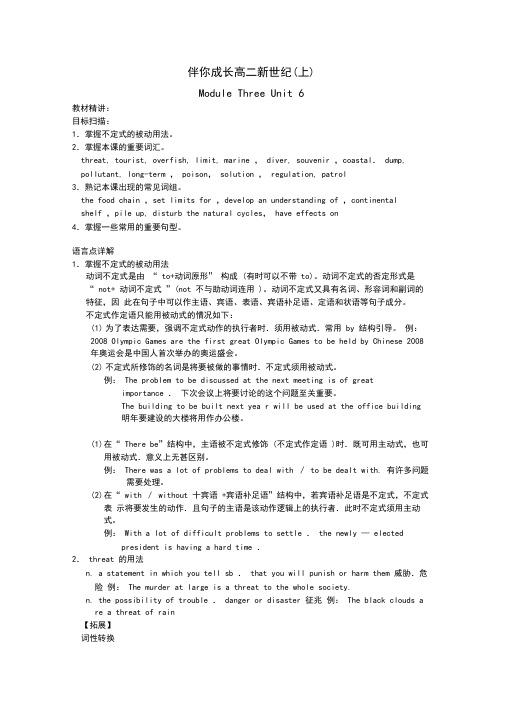
伴你成长高二新世纪(上)Module Three Unit 6教材精讲:目标扫描:1.掌握不定式的被动用法。
2.掌握本课的重要词汇。
threat, tourist, overfish, limit, marine , diver, souvenir ,coastal. dump, pollutant, long-term , poison, solution , regulation, patrol3.熟记本课出现的常见词组。
the food chain ,set limits for ,develop an understanding of ,continentalshelf ,pile up, disturb the natural cycles, have effects on4.掌握一些常用的重要句型。
语言点详解1.掌握不定式的被动用法动词不定式是由“ to+动词原形” 构成 (有时可以不带 to)。
动词不定式的否定形式是“ not+ 动词不定式”(not 不与助动词连用 )。
动词不定式又具有名词、形容词和副词的特征,因此在句子中可以作主语、宾语、表语、宾语补足语、定语和状语等句子成分。
不定式作定语只能用被动式的情况如下:(1)为了表达需要,强调不定式动作的执行者时.须用被动式.常用 by 结构引导。
例:2008 Olympic Games are the first great Olympic Games to be held by Chinese 2008 年奥运会是中国人首次举办的奥运盛会。
(2)不定式所修饰的名词是将要被做的事情时.不定式须用被动式。
例: The problem to be discussed at the next meeting is of greatimportance .下次会议上将要讨论的这个问题至关重要。
The building to be built next yea r will be used at the office building明年要建设的大楼将用作办公楼。
《新世纪英语》高二(上)【共364词】

favour ['feiv4] n.喜爱;支持;赞同v.喜欢;支持
interfere [.int4'fi4] v.妨碍,干预
iron ['ai4n] n.铁;熨斗v.(熨斗)慰平
jasmine ['d91smin] n.茉莉(花)
menu ['menju:] n.菜单
moderately ['m3d4ritli] adv.适量地,适度地
poisson [] n.毒药v.使中毒;毒杀
poisonous ['p3izn4s] adj.有毒的
pulse [p8ls] n.脉搏
pump [p8mp] n.泵,抽水机v.(用泵)抽(水)
mug [m8g] n.(有柄的)大杯
originate [4'rid9ineit] v.起源于
powdered ['paud4d] adj.粉末状的
scientific [sai4n'tifik] adj科学的
serving ['s4:vi6] n.(供一人享用的)一客;一份
socialize ['s4u54laiz] v.交际
《新世纪英语》高二(上)【共364词】.txt3努力奋斗,天空依旧美丽,梦想仍然纯真,放飞自我,勇敢地飞翔于梦想的天空,相信自己一定做得更好。4苦忆旧伤泪自落,欣望梦愿笑开颜。5懦弱的人害怕孤独,理智的人懂得享受孤独burger ['b4:g4] n.(非正式用语)汉堡包
ethnic ['e7nik] adj.种族的,民族的
horn [h3:n] n.(动物的)角
新世纪英语高二(上)英语期末考试(一)
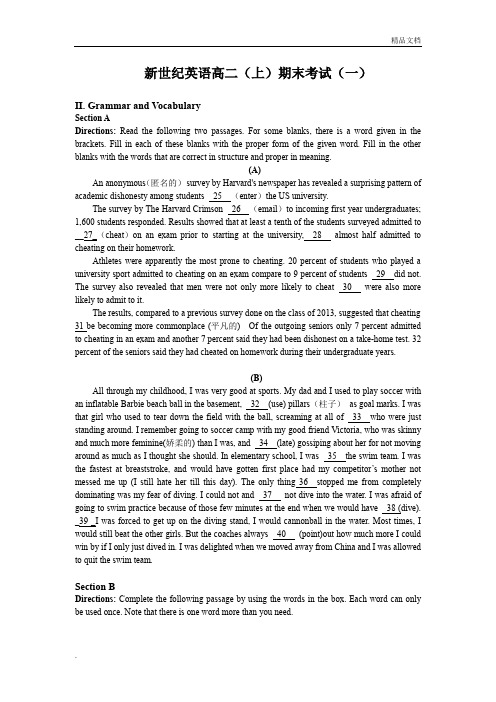
新世纪英语高二(上)期末考试(一)II. Grammar and VocabularySection ADirections:Read the following two passages. For some blanks, there is a word given in the brackets. Fill in each of these blanks with the proper form of the given word. Fill in the other blanks with the words that are correct in structure and proper in meaning.(A)An anonymous(匿名的)survey by Harvard's newspaper has revealed a surprising pattern of academic dishonesty among students 25 (enter)the US university.The survey by The Harvard Crimson 26 (email)to incoming first year undergraduates; 1,600 students responded. Results showed that at least a tenth of the students surveyed admitted to __27_(cheat)on an exam prior to starting at the university, 28 almost half admitted to cheating on their homework.Athletes were apparently the most prone to cheating. 20 percent of students who played a university sport admitted to cheating on an exam compare to 9 percent of students 29 did not. The survey also revealed that men were not only more likely to cheat 30 were also more likely to admit to it.The results, compared to a previous survey done on the class of 2013, suggested that cheating 31 be becoming more commonplace (平凡的) Of the outgoing seniors only 7 percent admitted to cheating in an exam and another 7 percent said they had been dishonest on a take-home test. 32 percent of the seniors said they had cheated on homework during their undergraduate years.(B)All through my childhood, I was very good at sports. My dad and I used to play soccer with an inflatable Barbie beach ball in the basement, 32 (use) pillars(柱子)as goal marks. I was that girl who used to tear down the field with the ball, screaming at all of 33 who were just standing around. I remember going to soccer camp with my good friend Victoria, who was skinny and much more feminine(娇柔的) than I was, and 34 (late) gossiping about her for not moving around as much as I thought she should. In elementary school, I was 35 the swim team. I was the fastest at breaststroke, and would have gotten first place had my competitor’s mother not messed me up (I still hate her till this day). The only thing 36 stopped me from completely dominating was my fear of diving. I could not and 37 not dive into the water. I was afraid of going to swim practice because of those few minutes at the end when we would have 38 (dive). _39 _I was forced to get up on the diving stand, I would cannonball in the water. Most times, I would still beat the other girls. But the coaches always 40 (point)out how much more I could win by if I only just dived in. I was delighted when we moved away from China and I was allowed to quit the swim team.Section BDirections: Complete the following passage by using the words in the box. Each word can only be used once. Note that there is one word more than you need.In his native Brazil, Pelé is hailed as a national hero. He is_known for his accomplishments and contributions to the game of footbal in addition to being 41_declared football ambassador of the world by FIFA and a national treasure by the Brazilian government. He is also acknowledged for his vocal support of policies to improve the social conditions of the poorDuring his 42 , he became known as "The King of Football" "The King Pelé" or _43 "The King". He is also a member of the American National Soccer Hall of Fame.Spotted by football star Waldemar de Brito, Pelébegan playing for Santos at 15 and his national team at 16, and won his first World Cup at 17. 44 numerous offers from European clubs, the economic conditions and Brazilian football 45 at the time benefited Santos, thus 46 them to keep Peléfor almost two decades until 1974. Peléplayed as an inside forward, striker, and what later became 47 as the playmaker position. Pelé's technique and natural athleticism have been universally praised and during his playing years he was renowned for his excellent dribbling and passing, his pace, 48 shot, exceptional heading ability, and prolific goalscoring.He is the all-time top scorer in the history of the Brazil national football team and is the only footballer to be a part of three World Cup-winning teams. In 1962 he was part of the Brazilian squad but due to an injury 49 in the 2nd match did not play the whole Cup. Officially, just in November 2007 FIFA 50 that he would be awarded the 1962 medal retroactively, making him the only player in the world to have three World Cup gold medals.ⅢReading ComprehensionSection ADirections: For each blank in the following passage there are four words or phrases marked A, B, C and D. Fill in each blank with the word or phrase that best fits the context.Energy drinks are beverages whose producers advertise that they "boost energy." These 51 usually do not emphasize energy derived from the sugar they contain but rather 52 energy release due to a variety of stimulants(兴奋剂) and vitaminsA variety of physiological and psychological effects have been _ 53 to energy drinks and their ingredients. Two studies reported significant improvements in mental and cognitive 54 as well as increased subjective alertness. Extra consumption of energy drinks may cause mild to moderate pleasure 55 caused by stimulant properties(特性) of caffeine and may also cause agitation, anxiety, irritability and sleeplessness. During 56 cycling tests in young healthy adults show that drinks can 57 increase upper body muscle endurance.Caution is warranted(确保的) even for healthy adults who choose to 58 energy drinks. Consumption of a single energy drink will not lead to excessive caffeine intake(摄入); 59, consumption of two or more drinks in a single day can. Other _60 such as ginseng(人参)are often added to energy drinks and may enhance the effects of caffeine, and ingredients such as guarana(瓜拉那)61 contain caffeineThe popular energy drink Red Bull was _62 in France after the death of an 18-year-old Irish athlete, Ross Cooney, who 63 within hours after playing a basketball game and consuming four cans of it. This ban was challenged in the European Court of Justice in 2004. The French Scientific Committee _ 64 that Red Bull had an excessive amount of caffeine. Denmarkalso banned Red Bull for a while, although the ban has recently been revoked(废除). The United Kingdom investigated the drink, but only 65 a warning against its use by children and pregnant women51. A. drinks B. advertisements C. producers D. beverages52. A. improved B. increased C. produced D. introduced53. A. contributed B. caused C. resulted D. attributed54. A. awareness B. abilities C. performances D. achievements55. A. particularly B. possibly C. partly D. primarily56. A. limited B. given C. planned D. repeated57. A. slightly B. significantly C. moderately D. mildly58. A. consume B. eat C. take D. use59. A. therefore B. Besides C. otherwise D. however60. A. drinks B. stimulants C. medicines D. vitamins61. A. itself B. themselves C. himself D. herself62. A. approved B. made C. controlled D. banned63. A. drank B. consumed C. died D. suffered64. A. found B. reached C. discovered D. concluded65. A. composed B. launched C. issued D. declaredSection BDirections: Read the following three passages. Each passage is Followed by several questions or unfinished statements. For each of them there are four choices marked A, B, C and D. Choose the one that fits best according to the information given in the passage you have just read.(A)66. What is the purpose of the advertisement?A. To ask readers to do their bit for the people who are likely to die frompreventable causes.B. To attract people's attention to the problem of water pollution.C. To help the homeless children in developing countries.D. To ask the readers to surf the Internet and become aware of the miserablethings in the world.67. You can help the children lacking in iron by _____.A. buying special greeting cards or gifts from UNICEFB. helping the program of diggingwells in poor areaC. doing some volunteer work for themD. keeping our environment from being polluted68. Supposing there are 300, 000 starving children, how much money will be needed to help themaccording to 2003 standard?A. 15 dollars.B. 20, 000 dollars.C. 4, 500, 000 dollars.D. 2, 200, 000 dollars.(B)Long bus rides are like television shows. They have a beginning, a middle, and an end with commercials (商业广告)thrown in every three or four minutes. The commercials are unavoidable. They happen whether you want them or not. Every couple of minutes a billboard glides by outside the bus window. "Buy Super Clean Toothpaste.” Drink Good Wet Root Beer.” Fill up with Pacific Gas.” Only if you sleep, which is equal to turning the television set off, are you spared the unending cry of "You Need It! Buy It Now!"The beginning of the ride is comfortable and somewhat exciting, even if you’ve traveled that way before. Usually some things have changed new houses, new buildings, sometimes even a new road. The bus driver has a style of driving and it’s fun to try to fi gure it out the first hour or so. If the driver is particularly reckless (鲁莽的)or daring, the ride can be as thrilling (惊心动魄的)as a suspense story. Will the driver pass the truck in time? Will the driver move into the right or the left-hand lane? After a while, of course, the excitement dies down. Sleeping for a while helps pass the middle hours of the ride. Food always makes bus rides more interesting. But you’ve got to be careful of what kind of food you eat. Too much salty food can make you very thirsty between stops.The end of the ride is somewhat like the beginning. You know it will soon be over and there’s a kind of expectation and excitement in that. The seat of course, has become harder as the hours have passed. By now you’ve sat with your legs cros sed, with your hands in your lap, with your hands on the armrest seven with your hands crossed behind your head. The end comes just at no more ways to sit.69. According to the passage, what do the passengers usually see when they are on a long bus trip?A. Buses on the road.B. Films on television.C. Advertisements on the billboards.D. Gas stations.70. What is the purpose of this passage?A. To give the writer’s opinion about long bus trips.B. To persuade you to take a long bus trip.C. To explain how bus trips and television shows differ.D. To describe the billboards along the road.71. The writer of this passage would probably favor____________.A. bus drivers who aren’t recklessB. driving aloneC. a television set on the busD. no billboards along the road72. The writer feels long bus rides are like TV shows because _________________ .A. the commercials both on TV shows and on billboards along the road are funB. they both have a beginning, a middle, and an end, with commercials in betweenC. the drivers are always reckless on TV shows just as they are on busesD. both traveling and watching TV are not exciting.73. The writer thinks that the end of the ride is somewhat like the beginning because both are _______________.A. excitingB. comfortableC. tiringD. boring(C)Are you a problem shopper? The answer is “Yes”, if you or someone else thinks that you sometimes get carried away with shopping. In other words, do you or does someone else think you are occupied in extreme shopping? If people have regrets later about their shopping, or have an “out-of-control” feeling about the quantities of what they buy or the amount of credit they use, they may be considered to be problem shoppers.Extreme shopping can lead to a more serious problem---addictive shopping. Addictive shoppers feel driven by the desire to shop and spend money. They experience great tension which drives them shop and spend money and they feel a “rush” during the time they are occupied wi th the shopping activity.Extreme or addictive shopping may result from long-time unpleasant feelings, of which anxiety, pain and shame are common ones. When we feel had inside, we often do something to make ourselves feel better. In this case, we often go shopping.A few people shop to relieve their boredom or emptiness. For some people, the motivation is a desire for status, power, beauty or success. Some love to shop as it makes them feel valuable in the eyes of the shop assistants. Others shop simply because it makes them forget, at least temporarily, tension, fear or unhappiness in their life.Besides, shopping malls are designed to encourage continual shopping. For instance, there are some malls where you can’t see clocks displaying the time because they don’t want you to become too aware of the time you spend there. What’s more, food courts, coffee shops and restrooms are provided, so you don’t have to leave the mall because of your physical needs.Therefore, once you become aware of how market forces work, you will certainly come to control your shopping behavior. For example, how much time you will spend and what areas you will visit can be decided before you enter the mall. Keep a written account of what items you will buy and how much money you will spend. Make a plan for what you are going to buy before you feel the urge to shop and then stick to it. That is vital (important) for gaining self-control.74. Which of the following people may not be problem shoppers?A. Those who cannot control the amount of credit they use.B. Those who just walk around the shopping malls.C. Those who are occupied in too much shopping.D. Those who feel sorry for their shopping.75. According to the passage, what may not result in addictive shopping?A. The awareness of how market forces workB. The desire for status, power, beauty or success.C. Boredom, emptiness, tension, fear or unhappiness in people's life.D. Long-time bad feelings of anxiety, pain and shame.76. What does the author suggest to control our shopping behavior?A. Never going to the shopping malls because there are many tricks.B. Applying for a credit card before we go shopping.C. Making the shopping time as short as possible.D. Making a shopping list before we go shopping.77. The author writes this passage to _______________.A. inform the shopping malls how to attract more shoppersB. provide solutions to the problem shoppingC. scold the problem shoppersD. tell a shopping storySection CDirections: Read the passage carefully. Then answer the questions or complete the statements in the fewest possible words.When we think of certain sports, we often associate them with certain countries. For example, most people believe that baseball—a popular American sport—was invented in the USA. The truth, however, is that baseball originated from two British sports—cricket and rounders. These games were being played before the United States even existed.In fact, many sports that people think were invented in one country actually originated elsewhere. For example, it is often claimed that football was invented in England, and that golf was invented in Scotland. But what are the real facts?When the Romans went to Britain in the 1st century AD, they played an early form of golf. The game was played with a stick and a small leather ball. The Romans introduced this game to other European countries such as France and the Netherlands. People in these countries then created their own versions of the game.The first written reference to golf was made in Scotland in 1457 when King James II banned the game. This was a time when there were many wars with England. The King needed his citizens to practice archery instead so that they could improve their shooting skills.One of England’s n ational sports, cricket, was definitely invented in England. It is known that cricket has been played in England since 1646 as this is when a cricket match was first recorded. However, it is possible to trace the origins of football back to the Ancient Chinese, Greek and Roman periods.Before rules were introduced, games of football in England were very disorganized and quite dangerous. Matches were played between neighboring villages, and teams sometimes consisted of hundreds of players. Each team would tr y to reach their opponents’ goal, which was sometimes six or seven kilometers from their own! The rules of modern football were added by students at English schools and universities in the mid-19th century. The first set of rules was published in 1848.78. Baseball is a sport similar to ____________________________________.79. How was the early form of golf played?80. King James II banned golf because_________________81.the origin of football might date back to _____________________第Ⅱ卷(共45分)I.TranslationDirections: Translate the following sentences into English, using the words given in the brackets.1. 就容量和速度而言,计算机是非常高效的。
新世纪英语高二第一学期Module One Unit 1 warm up and reading
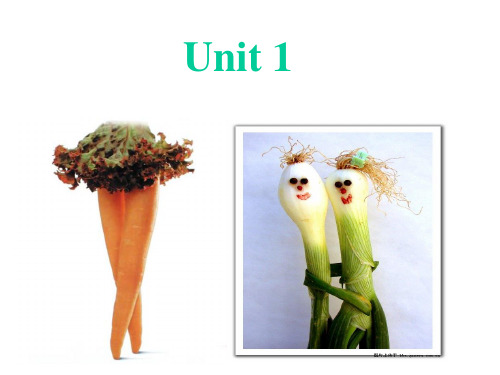
Today’s Menu ___________
Slogan _________
Sample sign
Lizzie’s Restaurant
Today’s Menu: spaghetti with beef raw cucumbers ice cream with strawberries yogurt
beponrdeoyrte-gbcyut-igivldievinifnoggofdfoooodd
What is a balanced diet?
A balanced diet ought to contain some _e_n_e_rg_y_-_g_i_v_in_g_, b__o_d_y_-b_u__il_d_in_g_, _p_r_o_t_ec_t_i_v_e_ food every meal without too much fat, sugar and salt.
The text is about ____ .
A. the two restaurants provided the healthy diet.
B. the reason why Yong Hui’s restaurant was so popular with customers.
C. how the competition took place between Wang Peng and Yong Hui.
2020/12/22
Unit2 Healthy eating
Preview
Yong Hui
Wang Peng
1. Who are the two persons? 2. Where may the story happen? 3. What may happen to them?
新世纪英语高二上知识点
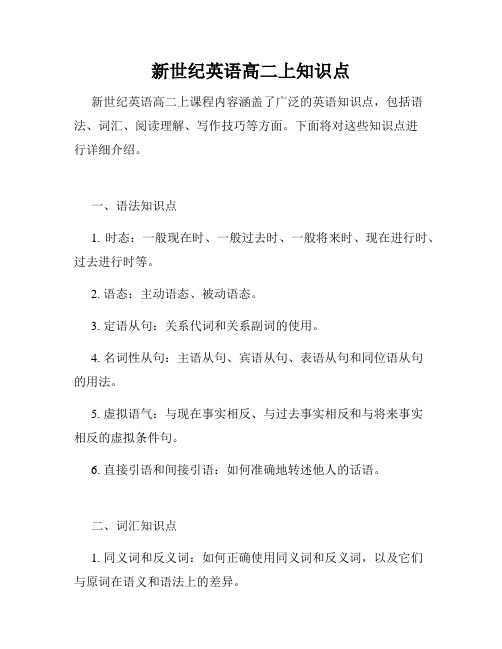
新世纪英语高二上知识点新世纪英语高二上课程内容涵盖了广泛的英语知识点,包括语法、词汇、阅读理解、写作技巧等方面。
下面将对这些知识点进行详细介绍。
一、语法知识点1. 时态:一般现在时、一般过去时、一般将来时、现在进行时、过去进行时等。
2. 语态:主动语态、被动语态。
3. 定语从句:关系代词和关系副词的使用。
4. 名词性从句:主语从句、宾语从句、表语从句和同位语从句的用法。
5. 虚拟语气:与现在事实相反、与过去事实相反和与将来事实相反的虚拟条件句。
6. 直接引语和间接引语:如何准确地转述他人的话语。
二、词汇知识点1. 同义词和反义词:如何正确使用同义词和反义词,以及它们与原词在语义和语法上的差异。
2. 词性转换:名词、动词、形容词和副词之间的转换,并学习正确运用这些词性。
3. 词汇搭配:掌握常用动词、副词和形容词的搭配,以便更准确地表达自己的意思。
4. 习惯用语和惯用法:学习常见的习惯用语和惯用法,使语言更地道自然。
三、阅读理解知识点1. 主旨理解:从文章的标题、首尾段以及关键句中抓住主旨,理解整篇文章的基本信息。
2. 细节理解:根据文章中的具体细节信息回答问题。
3. 推理判断:通过对文章中的暗示和线索作出合理推理判断,补充和拓展文章的信息。
4. 词义推测:根据上下文猜测单词或短语的含义。
5. 阅读策略:掌握阅读技巧,如快速浏览、预测问题、定位答案等,提高阅读效率。
四、写作技巧1. 句子结构:学习各种句子结构、短语和连词的使用,使文章结构清晰、连贯。
2. 文章段落:拟定合适的主题句,构建完整的段落结构,使文章条理清晰。
3. 逻辑关系:运用转折、因果、并列等逻辑关系词,使文章更具说服力和连贯性。
4. 写作风格:培养个人写作风格,注重语言的准确性、表达的精练性和适度的修辞手法的使用。
综上所述,新世纪英语高二上的课程涵盖了各个方面的英语知识点,包括语法、词汇、阅读理解以及写作技巧。
学生通过学习这些知识点,能够提高自己的语言表达能力和英语综合运用能力。
- 1、下载文档前请自行甄别文档内容的完整性,平台不提供额外的编辑、内容补充、找答案等附加服务。
- 2、"仅部分预览"的文档,不可在线预览部分如存在完整性等问题,可反馈申请退款(可完整预览的文档不适用该条件!)。
- 3、如文档侵犯您的权益,请联系客服反馈,我们会尽快为您处理(人工客服工作时间:9:00-18:30)。
pump [p8mp] n.泵,抽水机v.(用泵)抽(水)
stimlate [] v.(供煎,烤等的)厚片的肉(尤指牛肉)或鱼
stimulating [] adj.刺激的,鼓舞的
vessel ['vesl] n.血管,脉管
worthwhile ['w4:0'(h)wail] adj.值得(做)的
hook [huk] v.钩住n.钩,吊
imagination [i.m1d9i'nei54n] n.想象力
menu ['menju:] n.菜单
moderately ['m3d4ritli] adv.适量地,适度地
poisson [] n.毒药v.使中毒;毒杀
poisonous ['p3izn4s] adj.有毒的
iron ['ai4n] n.铁;熨斗v.(熨斗)慰平
jasmine ['d91smin] n.茉莉(花)
mug [m8g] n.(有柄的)大杯
originate [4'rid9ineit] v.起源于
powdered ['paud4d] adj.粉末状的
scientific [sai4n'tifik] adj科学的
count [kaunt] v.计数,数数n.计数,得数
determined [di't4:mind] adj.决意的,坚决的
experienced [ik'spi4ri4nst] adj.有经验的;经验丰富的,熟练的
frightening ['frait4ni6] adj.令人恐惧的,可怕的
all-round [] adj.全能的,全面的
Brazilian [br4'zilj4n] adj.巴西的n.巴西人
coach [k4ut5] n.教练v.教,训练
fan [f1n] n.狂热的爱好者,迷
final ['fain4l] adj.最后的,最终的n.决赛
foul [faul] v.犯规n.(体育方面)犯规
determination [di.tɜ:mi'nei54n] n.决心,坚决
dive [daiv] v.跳水;潜水
gymnastics [d9im'n1stiks] n.体操
Olympic [4u'limpik] adj.奥林匹克运动会的 peak pi:k] n.顶峰,最高点
lonch break [] 午餐休息
physical well-being [] 身体健康
rush through [] 匆匆完成
accidentally [.1ksi'dent4li] adv.偶然地,意外地
appetizer ['1pitaiz4] n.(正餐前的)开胃菜
curry ['k8ri] n.咖啡调制的肉或蔬菜
junior ['d9u:nj4] adj.青少年的;地位低的
league [li:g] n.(竞赛)联合会
neighbourhood ['neib4hud] n.邻近地区
rent [rent] n.租金v.租(借)
score [sk3:, sk34] v.得分,进球
sound [saund] adj.鞋底
pasta ['p2:st4] n.意大利面食
peel [pi:l] v.录……的皮;削……皮n.(某些蔬菜或水果的)皮
preservation [.prez4(:)'vei54n] n.保护,储藏
roast [r4ust] adj.烤制的v.烤
sauce [s3:s] n.酱汁,调味汁
spice [spais] n.(电视)特别节目
burger ['b4:g4] n.(非正式用语)汉堡包
ethnic ['e7nik] adj.种族的,民族的
immigrant ['imigr4nt] n.移民
preservative [pri'z4:v4tiv] n.防腐剂
rush [r85] v.匆忙地做n.冲进;忙乱
solid ['s3lid] adj.固体的,结实的n.固体
trail [treil] n.痕迹;踪迹
tremble ['trembl] v.战栗,发抖
wrapping ['r1pi6] n.包装纸,包装材料
be crazy about [] 热衷于……;痴迷于……
ice hockey [] 冰上曲棍球
indoor sports [] 室内运动
per head [p4:'hed] 每人
the medals table [] 奖牌榜
to help somebody out [] 帮助某人解决困难
beauty ['bju:ti] n.美,美景
bush [bu5] n.灌木丛
at somebody's mercy [] 听任摆布
at the cost of [] 以……为代价
by the dozen [] 大批(地)、大量(地)
catch somebody off his guard [] 攻其不备
throw all caution to the winds [] 不顾一切
deadly ['dedli] adj.致命的
digestion [di'd9est54n, dai'd9est54n] n.消化
effective [i'fektiv] adj.有效的,有作用的
favour ['feiv4] n.喜爱;支持;赞同v.喜欢;支持
interfere [.int4'fi4] v.妨碍,干预
serving ['s4:vi6] n.(供一人享用的)一客;一份
socialize ['s4u54laiz] v.交际
teabag [] n.袋泡茶
teahouse ['ti:haus] n.(中国或日本的)茶馆
teapot ['ti:p3t] n.茶壶
time-honoured [] adj.因为古老而受敬仰的
act on [] 对……起作用,按……行动
be with somebody [] 赞成某人
by no means [] 决不,一点也不
draught beer [] 生啤,鲜啤
get hooked on [] 沉溺于
bend [bend] v.弯腰;曲身
clinch [klint5] n.扭成一团v.(摔跤等时)用臂钳住对手
round [raund] n.(比赛等的)回合,轮,场
stubbornly ['st8b4nli] adv.顽固地;执拗地
trick [trik] n.诡计;欺诈手段v.欺诈
unattended ['8n4'tendid] adj.无人管的,无人照料的
unwillingly ['8n'wili6li] adv.不情愿地,勉强地
unprocessed [.8n'pr4usest; -'pr3-] adj.未加工的
vast [v2:st] adj.广大的;巨大的
vegetarian [.ved9i'tA4ri4n] n.素食者
well-being ['welbii6] n.健康,幸福
even if [] 即使
health food [] 健康食品
rifle ['raifl] n.步枪
shadwich [] n.三明治
scratch [skr1t5] v.轻搔(以止痒)
slam [sl1m] n.砰的声音
thermos ['74:m3s] n.保湿瓶,热水瓶
thrill [7ril] n.一阵激动;使人欢快的事物v.使感到激动,使紧张、震颤
Roman [r3m4] adj.&n罗马的;罗马人
scale [skeil] n.规模;等级
separate ['sep4reit] a.不同的,分开的v.分开,使分离
touch [t8t5] n.润色;触摸v.接触
understandable [8nd4'st1nd4b(4)l] adj.可理解的,可谅解的
equal ['i:kw4l] v.与……相等,抵得上n.(在某一方面)平等的人
hockey ['h3ki] n.曲棍球
rugby ['r8gbi] n.橄榄球
soccer ['s3k4] n.平稳的,安稳的
willing ['wili6] adj.愿意帮忙的,不反对的
as a result [] 因此
storm [st3:m] v.拥进
tournament ['tu4n4m4nt] n.锦标赛
for good [] 永远
in a row [] 连续
lose heart [] 灰心
odd jobs [] (通常指为别人做的)零活
amaze [4'meiz] v.使大为惊讶,使惊愕
continuous [k4n'tinju4s] adj.连续的,持续的
steak [steik] n.香料,调味品
